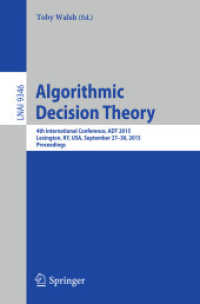- ホーム
- > 洋書
- > 英文書
- > Transportation
Full Description
This two-volume set covers organizational psychology and human factors in aerospace and other extreme environments. Organizational psychology and organizational science, human factors, psychology, and aerospace have matured in parallel since World War II. However, the practice at NASA has historically lagged behind, but is now catching up. This set is targeted at professionals with an interest in human factors and psychology at work. Industrial-organizational psychologists will be exposed to traditional applied psychology topics, but presented with a broader multidisciplinary context such as the influences of human factors and physiological health on individual and team job performance.
Contents
Book 1 - Psychology and Human Performance in Space Programs: Research at the Frontier
Introduction. Section 1: Challenges of Studying Psychological Concepts in Extreme Environments. 1. Environment and Physiological Changes. 2. Analogs and Physiological and Psychological Fidelity. 3. Conducting Research in Analogs. 4. Qualitative Research in Extreme Environments. 5. Technological Advances in IO and Extreme Environments. Section 2: Composing and Training Crews. 6. Team Composition. 7. Methods of (technical) Training to Enhance Retention. 8. Resilience and Adaptability. 9. Multi-Cultural Training and Perspective. 10. Leadership/ Followership. 11. Teamwork. 12. Team Orientation and Group Living Skills. Section 3: Supporting Crews. 13. Psychosocial Adaptation. 14. Multi-Team Systems. 15. Habitability. 16. Human Factors Design. 17. Human-Computer and Automation Integration.
Book 2 - Psychology and Human Performance in Space Programs: Extreme Application
Foreword. Introduction. Section 1: Selecting the Crew/Team. 1. Selection for Extreme Environments. 2. Job Analysis and Alternative Methods of Job Validation. 3. Development of Experiential Exercises for Selection. Section 2: Training the Crew/Team. 4. Methods of
(technical) Training to Enhance Retention. 5. Team Training. 6. Group Living and Caring for Team and Self. Section 3: Supporting the Crew/Team. 7. Psychosocial Adaptation. 8. Psychological Support and Family Support. 9. Crew Self-Support. 10. Habitats and Habitability in Extreme Environments. 11. Human-Computer Interaction in Extreme Environments. Section 4: Organizational Processes. The Power of an Overarching Goal/Mission. 13. NASA and International Partners as Case Study of Organizational Mission. Section 5: Looking Forward. 14. Future Directions. 15. Inspirational Essay.








